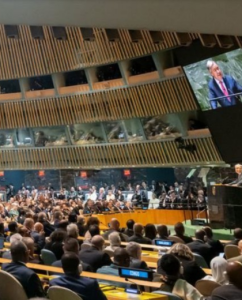UN faces Trump-induced funding crisis, report finds
As it marks its 80th year, the United Nations is facing an existential funding crisis.
With a growing shortfall in contributions – $US2.4 billion in unpaid regular budget dues and $US2.7 billion in peacekeeping – the UN has been forced to cut spending, freeze hiring, and scale back some services.
UN officials have warned that this risks eroding the UN’s credibility and its capacity to fulfil mandates entrusted to it by member states.
And, according to an analysis by the Washington-based think tank The Pew Research Centre, the situation could worsen as the United States – the UN’s largest funder and debtor – reassesses its ties to the organisation and disengages from international organisations, as a result of edicts from the Trump administration.
The US recently left several UN agencies, including the World Health Organisation and Human Rights Council. It plans to withdraw from UNESCO by the end of next year.
In July, US Congress passed a Trump administration package to rescind about USD $1 billion of previously approved UN funding.
And further cuts may be forthcoming with the administration ending UN peacekeeping payments and pausing most of other UN contributions, according to the Pew Centre report.
In response, the UN has been curbing program spending, freezing hiring and launching efficiency initiatives.
It has also used reserve fund accounts five times since July 2019, borrowing a record $607 million in 2024.
The Pew Centre report says that the UN’s financial viability “largely depends on how – and whether – the US decides to support the organisation moving forward”.
It says the UN is primarily funded by its 193 member states through mandatory assessed contributions and it receives separate contributions for its two main budgets.
They are the ‘regular budget’, which finances core organisational activities that the General Assembly approves, including those related to economic and social development, disarmament projects, and human rights issue.
And, the ‘peacekeeping budget’, which finances most UN peacekeeping missions and several service centres worldwide.
The regular budget applies to each calendar year, while the peacekeeping budget covers each fiscal year, which runs from July 1 to June 30.
Other assessed contributions fund the organisation’s tribunals and headquarters.
And, the UN operates programs such as the World Food Program and the United Nations Children’s Fund (UNICEF), that are exclusively funded through voluntary contributions from member states.
“The amount each member must pay annually varies based on its relative ‘capacity to pay’, using a formula – which accounts for the country’s gross national income, population size and external debt, among other factors – to establish the ‘scale of assessments’ for the regular budget,” the report says
“The scale ranges from 0.001 per cent of the budget to 22 per cent, but contributions for the least developed countries are capped at 0.01 per cent.
“The scale for the peacekeeping budget follows the same system, but the rates are adjusted, with the five permanent member states of the Security Council – China, France, Russia, the United Kingdom and the US – bearing the brunt of the cost.
“As the world’s largest economy, the US has always been assessed at the maximum rate. This year, it was responsible for 22 per cent of the UN’s regular budget assessments, or USD $820.4 million of the USD $3.5 billion net total.
“China was responsible for paying the next-largest share (20.004 per cent, or USD $679.8 million). Japan was a distant third at 6.930 per cent (USD $235.5 million).
“On the other hand, 175 of the 193 member states were each responsible for less than 1 per cent of the UN’s regular budget in 2025. This includes 28 states assessed at the minimum 0.001 per cent rate.”
The US also historically pays the most for the UN peacekeeping budget – in 2025 (26.158 per cent, or USD $6.5 million of the USD $25 million total). China (23.785 per cent, or USD $5.9 million) and Japan (6.930 per cent, or USD $1.7 million) again had the next-highest assessments.
Contributions are due within 30 days of assessment notice from the UN Secretary General, usually around early or mid-February for the regular budget. But the UN has always struggled to get members – and especially the US – to pay their contributions on time, or even at all, the Pew report says.
No more than 53 of the 193 member states have paid their regular budget contributions on time each year since 2019, it says.
And over the past two decades, the UN has never received full contributions from all members.
“Member states might withhold both regular budget and peacekeeping contributions for many reasons, including differences between national and UN fiscal calendars, financial constraints, or political objections to UN program goals or resolutions,” the Pew report says.
The US’ withdrawal from the UN comes despite most Americans actually valuing the institution.
“Many Americans (63 per cent) say they think the US benefits from UN membership a great deal or fair amount. The share who say this has risen slightly since last March (up 3 per centage points),” the report says.
However, views differ widely by party, it says.
“Democrats and Democratic-leaning independents are about twice as likely as Republicans and GOP leaners to say that the country benefits from UN membership (82 per cent vs 43 per cent),” the report says.
“More Republicans instead take the opposite view: 56 per cent don’t think the US benefits much or at all, including 65 per cent of conservative Republicans.
“More broadly, a 57 per cent majority of US adults express a favourable view of the UN – up 5 points since spring 2024. While Democrats have become more likely to see the UN positively over this time span, Republicans’ views remain statistically unchanged,” the Pew report said.
Read more:
How the United Nations is funded, and which countries pay the most | Pew Research Center
UN faces deepening financial crisis, urges members to pay up | UN News












